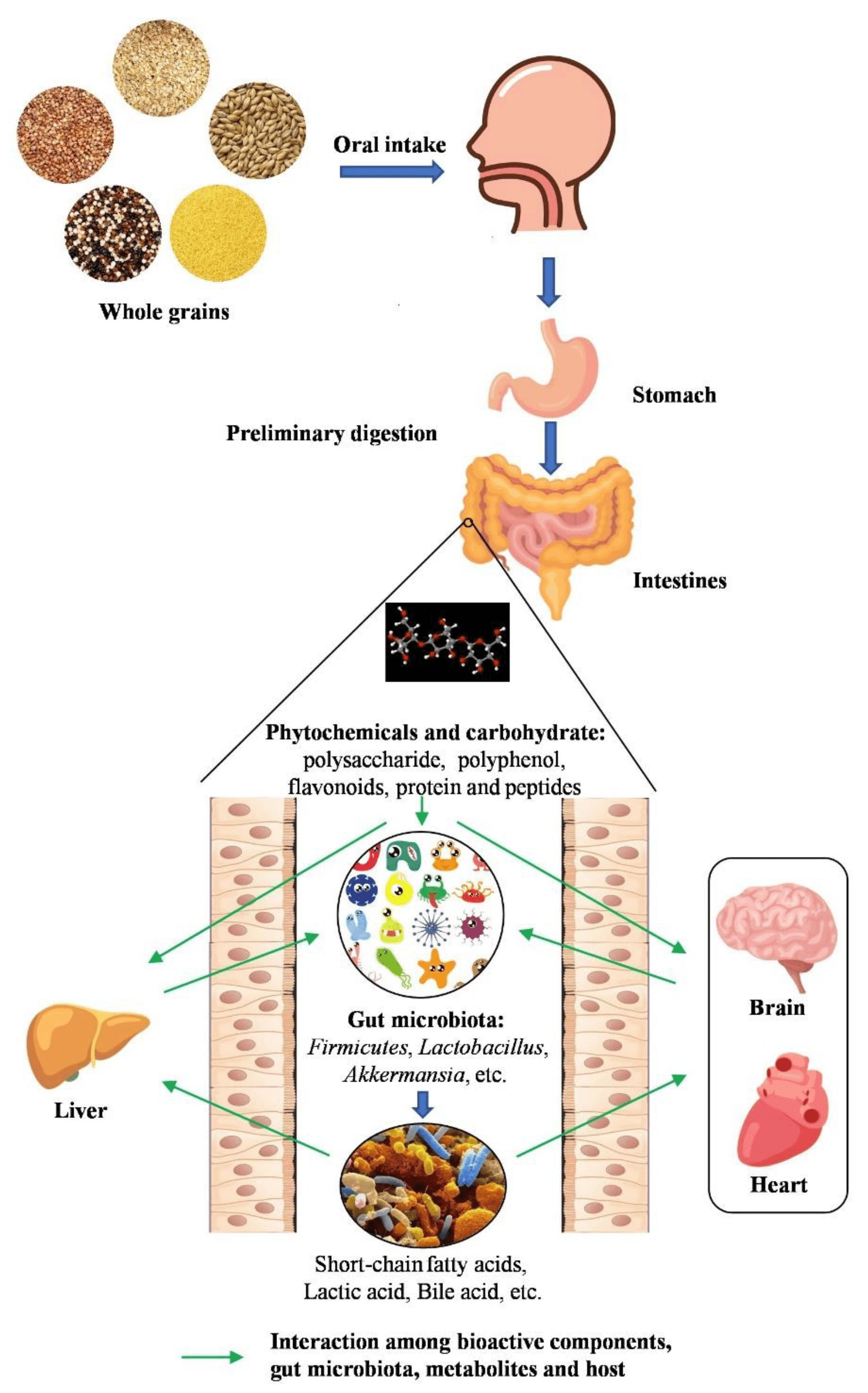In the quest for a healthy diet, whole grains have long been championed for their numerous benefits. However, have you ever wondered if these dietary staples could potentially disrupt the delicate balance of your gut microbiome? The latest research indicates that while whole grains are generally beneficial for gut health, their impact on the delicate ecosystem of microbes in your digestive system may be more nuanced than previously thought. Join us as we explore the fascinating interplay between whole grains and gut microbiome balance, and uncover the surprising insights that scientists have uncovered.
Overview of Gut Microbiome Balance
The gut microbiome refers to the complex community of microorganisms that reside in our gastrointestinal tract. This community is made up of trillions of bacteria, viruses, fungi, and other microorganisms that play a crucial role in our overall health. It is essential for maintaining a balance between beneficial and harmful microorganisms in the gut to ensure optimal gut microbiome balance.
Composition of gut microbiome
The gut microbiome is composed of a wide variety of microorganisms, including bacteria from different families, such as Bacteroidetes and Firmicutes, as well as archaea, viruses, fungi, and other microorganisms. These microorganisms work together in a complex ecosystem, interacting with each other and with the human host.
Importance of gut microbiome balance
Maintaining a healthy gut microbiome balance is vital for several reasons. Firstly, the gut microbiota plays a crucial role in the digestion and absorption of nutrients from the food we eat. Additionally, it helps to support a robust immune system, protects against harmful pathogens, and regulates the metabolism of different compounds in our body.
Role of Whole Grains in Gut Health
Whole grains are an integral part of a healthy diet and have long been associated with numerous health benefits. In particular, they are known to have a positive impact on gut health. Let’s delve deeper into the role of whole grains in maintaining a healthy gut microbiome balance.
Nutritional value of whole grains
Whole grains are rich in essential nutrients, including dietary fiber, vitamins, minerals, and antioxidants. They provide a significant source of energy and contribute to the overall nutritional content of our diet. Whole grains typically contain three parts – the bran, germ, and endosperm – each of which provides unique nutritional benefits.
Relationship between whole grains and gut health
Several studies have shown a positive association between whole grain consumption and a healthy gut microbiome. The fiber content in whole grains acts as a prebiotic, providing nourishment for beneficial bacteria in the gut. This, in turn, promotes the growth of these beneficial bacteria and helps maintain a balanced gut microbiome.
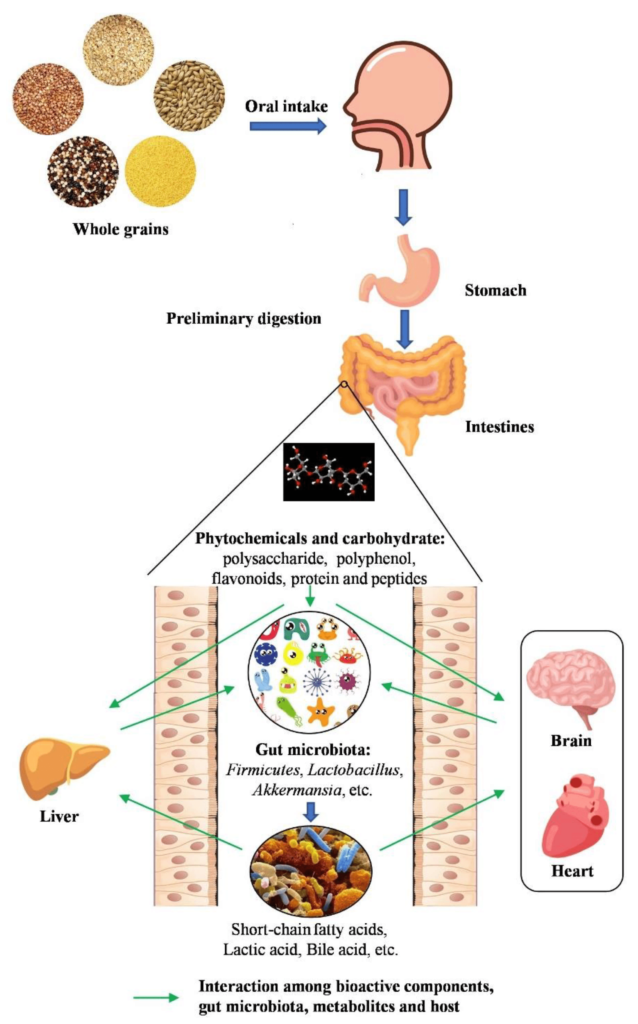
This image is property of www.mdpi.com.
Effects of Whole Grains on Gut Microbiome
Consuming whole grains can have multiple beneficial effects on the gut microbiome. Let’s explore some of these positive effects.
Positive effects of whole grains on gut microbiome
-
Increased abundance of beneficial bacteria: Whole grains, especially those high in fiber, have been shown to promote the growth of beneficial bacteria, such as Bifidobacteria and Lactobacillus. These bacteria produce short-chain fatty acids (SCFAs), which have been linked to various health benefits, including reduced inflammation and improved gut barrier function.
-
Enhanced diversity of gut microbiota: Including whole grains in your diet can increase the diversity of your gut microbiota, which is associated with better overall gut health. A diverse gut microbiome is more resilient and better equipped to handle challenges, such as dietary changes or pathogenic invasions.
Potential adverse effects of whole grains on gut microbiome
While whole grains are generally considered beneficial for gut health, it is worth mentioning that some individuals may experience adverse effects when consuming certain types of whole grains. This can be due to factors such as an underlying health condition, specific dietary sensitivities, or individual variations in gut microbiota composition.
It is important to note that the adverse effects are not typically related to the whole grains themselves but rather individual responses. If you experience any digestive discomfort or adverse symptoms after consuming whole grains, it is recommended to consult with a healthcare professional to determine the underlying cause.
Fiber Content in Whole Grains
Fiber is a key component of whole grains that contributes to their positive impact on the gut microbiome. Let’s explore the role of fiber in gut health and the different types of fiber found in whole grains.
Role of fiber in gut health
Fiber plays a vital role in maintaining a healthy gut by providing nourishment for the beneficial bacteria in our microbiome. It acts as a prebiotic, meaning it serves as a food source for these bacteria, allowing them to thrive and carry out essential functions in the gut.
Additionally, fiber helps regulate bowel movements, supports regularity, and prevents constipation. It also aids in weight management by promoting a feeling of fullness and reducing calorie intake.
Types of fiber in whole grains
Whole grains contain two main types of fiber: soluble fiber and insoluble fiber. Soluble fiber dissolves in water and forms a gel-like substance in the gut, which helps to slow down digestion, regulate blood sugar levels, and lower cholesterol levels. Insoluble fiber, on the other hand, adds bulk to the stool, promoting regular bowel movements and preventing constipation.
Different whole grains may have varying proportions of soluble and insoluble fiber, making it beneficial to consume a variety of whole grains to obtain a diverse range of fiber types.
Impact of fiber on gut microbiome balance
The consumption of fiber-rich foods, such as whole grains, can positively impact gut microbiome balance. As fiber travels through the digestive system, it undergoes fermentation by gut bacteria, leading to the production of SCFAs, such as butyrate. SCFAs serve as an energy source for the cells lining the colon and provide numerous benefits, including anti-inflammatory effects and maintenance of a healthy gut barrier.
Furthermore, the production of SCFAs by gut bacteria helps create an environment that is unfavorable for the growth of harmful microbes, thus promoting gut microbiome balance and overall gut health.
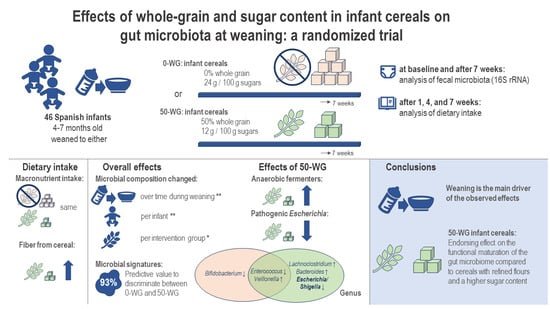
This image is property of pub.mdpi-res.com.
Processing and Refining of Whole Grains
The way whole grains are processed can have an impact on their potential to influence gut microbiome balance. Let’s explore the effects of processing on the gut microbiome and compare whole grains to refined grains.
Effects of processing on gut microbiome balance
Processing whole grains involves removing certain parts, such as the bran and germ, to create refined grains. Unfortunately, this process also removes a significant portion of the fiber and beneficial nutrients found in whole grains. As a result, consuming refined grains may have a less favorable impact on gut microbiome balance compared to consuming whole grains.
The lower fiber content in refined grains can lead to a decreased production of SCFAs by gut bacteria, potentially compromising gut health. Additionally, the removal of certain nutrients during processing may deprive the gut microbiota of necessary substrates for their growth and function.
Comparison between whole grains and refined grains
It is important to note that while whole grains are generally considered more beneficial for gut health, refined grains can still be a part of a balanced diet. However, due to their lower fiber content and reduced nutritional value, it is recommended to prioritize the consumption of whole grains for optimal gut microbiome balance.
Individual Variations in Gut Microbiome Response
Every individual has a unique gut microbiome composition, influenced by various factors. Understanding these factors can help explain why individuals may respond differently to the consumption of whole grains.
Genetic factors
Genetics plays a role in shaping the composition of our gut microbiome. Certain genetic variations can determine an individual’s susceptibility to certain gut-related conditions or influence their ability to metabolize certain compounds present in whole grains. However, more research is needed to fully understand the extent of genetic influences on gut microbiome response to whole grains.
Dietary habits
Dietary habits, including the regular consumption of whole grains, can shape the gut microbiome over time. Individuals who regularly consume whole grains as part of their diet are more likely to have a gut microbiome that is adapted to efficiently metabolize the compounds present in these foods. On the other hand, individuals who consume a diet low in whole grains may have a gut microbiome that is less adapted to these foods.
Environmental factors
Various environmental factors, such as exposure to antibiotics, stress levels, sleep patterns, and physical activity, can influence the gut microbiome composition. These factors can also interact with the consumption of whole grains and affect the response of the gut microbiome to these foods. It is important to consider these environmental factors when assessing the impact of whole grains on gut microbiome balance.

This image is property of foodinsight.org.
Prebiotics and Probiotics in Whole Grains
Whole grains not only provide fiber but may also contain prebiotics and probiotics, which can further support a healthy gut microbiome. Let’s explore the presence and benefits of prebiotics and probiotics in whole grains.
Definition and benefits of prebiotics
Prebiotics refer to certain types of fiber that pass through the digestive system undigested, reaching the colon where they serve as food for beneficial gut bacteria. By promoting the growth of beneficial bacteria, prebiotics help maintain a healthy gut microbiome, improve digestion, and enhance nutrient absorption.
Whole grains, particularly those high in fiber, are a rich source of prebiotics. Regular consumption of these foods can contribute to a robust gut microbiome and overall gut health.
Role of probiotics in gut health
Probiotics are live microorganisms that, when consumed in adequate amounts, confer health benefits to the host. They can help replenish and maintain a healthy balance of beneficial bacteria in the gut, supporting optimal gut microbiome balance.
While whole grains do not typically contain live probiotic microorganisms, they can still indirectly support the growth and activity of probiotics in the gut. The fiber content in whole grains provides an ideal environment for probiotics to flourish and carry out their beneficial functions.
Presence of prebiotics and probiotics in whole grains
Whole grains, such as oats, barley, and wheat, contain varying amounts of prebiotics and can contribute to the overall prebiotic content of a balanced diet. In terms of probiotics, whole grains do not typically contain live cultures but can support the growth and activity of beneficial bacteria in the gut, indirectly promoting a healthy gut microbiome.
Studies on Whole Grains and Gut Microbiome
Numerous studies have investigated the relationship between whole grains and gut microbiome health. Let’s explore some of the research findings and consider the limitations and gaps in current studies.
Research findings on whole grains and gut health
Many studies have found a positive association between whole grain consumption and a healthy gut microbiome. For example, a study published in the American Journal of Clinical Nutrition found that individuals who consumed whole grains had higher levels of beneficial gut bacteria, such as Bifidobacteria and Lactobacillus, compared to those who consumed refined grains.
Other studies have also observed increased biodiversity and improved gut barrier function in individuals with higher whole grain intake. These findings support the notion that whole grains can have a beneficial impact on gut microbiome balance.
Limitations and gaps in current studies
While research on whole grains and gut microbiome health is promising, there are still some limitations and gaps to be addressed. Many studies have relied on self-reported dietary assessments, which can be subject to recall bias. Additionally, the studies often have small sample sizes and may not account for other dietary and lifestyle factors that can influence gut health.
Further research is needed to better understand the mechanisms behind the effects of whole grains on the gut microbiome, including the specific types and amounts of whole grains that provide the most significant benefits. Long-term studies that follow participants over an extended period are also necessary to determine the sustained effects of whole grain consumption on gut microbiome balance.
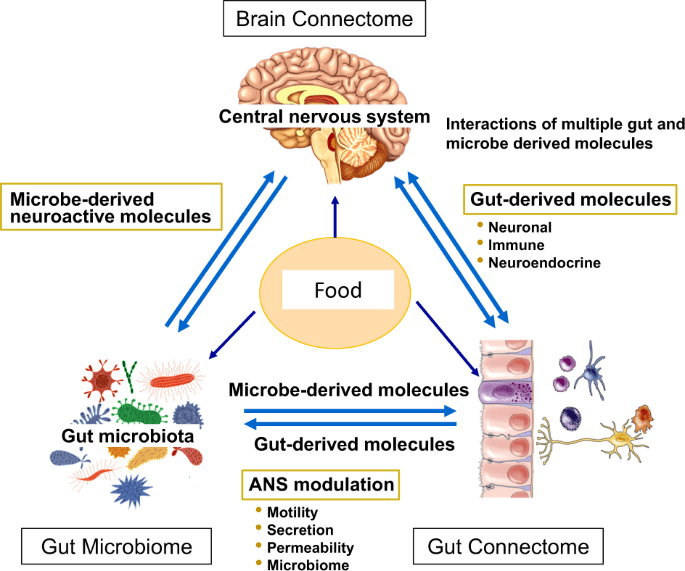
This image is property of media.springernature.com.
Balanced Diet and Gut Microbiome
Maintaining a balanced diet is essential for optimal gut microbiome balance. While whole grains can contribute to a healthy gut, it is important to consider their role in the context of a diverse food choices.
Importance of diverse food choices
A diverse diet that includes a wide variety of foods is crucial for a healthy gut microbiome. Different foods provide unique nutrients that support the growth and function of various microorganisms in the gut. By consuming a diverse range of foods, including whole grains, fruits, vegetables, legumes, and lean proteins, you can promote a diverse gut microbiota and maintain a balanced gut microbiome.
Combining whole grains with other gut-friendly foods
To maximize the positive impact of whole grains on gut health, it is beneficial to combine them with other gut-friendly foods. For example, pairing whole grains with fruits and vegetables can provide additional fiber, vitamins, minerals, and antioxidants that further support gut microbiome balance. Including fermented foods, such as yogurt or sauerkraut, can also introduce probiotics that promote a healthy gut.
Remember that moderation and balance are key when it comes to incorporating whole grains and other gut-friendly foods into your diet. Aim for a well-rounded eating pattern that includes a variety of nutrient-dense foods.
Conclusion
In conclusion, whole grains have a significant role in maintaining a healthy gut microbiome balance. The nutritional value of whole grains, particularly their fiber content, supports the growth of beneficial bacteria and enhances gut health. While adverse effects are generally rare, individual variations can influence gut microbiome response to whole grains.
Understanding the importance of whole grains in a balanced diet, as well as considering other factors such as genetic influences, dietary habits, and environmental factors, can further optimize gut microbiome health. The presence of prebiotics and the potential support for probiotics in whole grains further contribute to a healthy gut microbiome.
Continued research is necessary to fully grasp the mechanisms and long-term effects of whole grain consumption on gut microbiome health. By prioritizing a varied and balanced diet that includes whole grains and other gut-friendly foods, you can support a thriving gut microbiome and overall well-being.
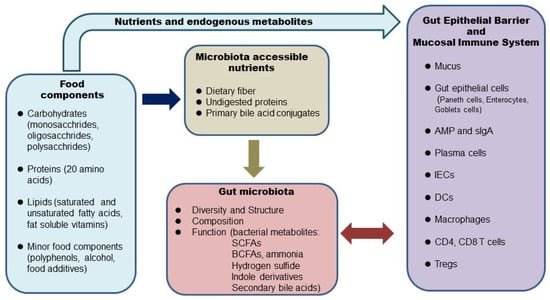
This image is property of www.mdpi.com.

